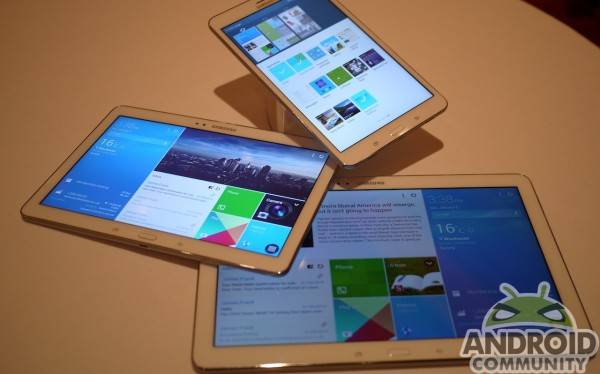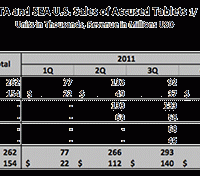
A new document introduced in the latest Apple versus Samsung trial shines a light on an ongoing point of contention for market share statistics: sales versus shipments. Sales of devices don’t always translate to shipments, but the two are often confused. It seems the document suggests that Samsung’s performance in the tablet market may not have been as successful as we have been led to believe. In fact, they may not have had much success at all.
The trial, which has mushroomed into a war on integrity at this point, produced an internal Samsung document that showed their sales of Galaxy Tab devices was so slight they were being eclipsed by Kindle devices and Nook sales. Not only were sales known to be diminutive, Samsung knew about them, and purposefully mislead analysts and investors about the health of their tablet business.
In slides from the trial, which you can see below, Samsung spells out Galaxy Tab sales both quarterly and annually in the US. Quarterly sales were in the hundreds of thousands, while annual sales were roughly one million tablets for 2011. This was a contrast to — by Samsung’s own metrics — 17.4 million iPads sold, 5 million Kindle Fire tablets, and 1.5 million Nook devices sold in the US for 2011.
This opens up discussion on two fronts: sales versus shipments, and device use statistics. Time and again, we find reports suggesting iOS devices — specifically iPads — have better web usage statistics. These reports are prominently rolled out just after the holiday shopping season, where it’s found that Apple’s devices command a much larger slice of both the browsing and online purchasing pie. Use of a device can be used to directly relate to sales.
It seems we now have a reason for those numbers, and it has to do with sales versus shipments — and how they’re reported, both to analysts, and to us. Samsung tablet sales simply weren’t what analysts and investors were led to believe, causing inflated metrics and market share statistics. That, in turn, is related to us as a false sense of popularity for Samsung tablets. We’ll keep in mind the slides shown are internal Samsung documents, which lends a damning credence to the revelations.
Source: Apple Insider













😛 Given the spec of Galaxy Tab, I have no doubt that the sales is bad. I would be more interested in the sales of Note 10.4 2014 edition.
Btw your article NEVER did say where did Samsung intentionally misled the public about the sales figure. Did they actually announced a FAKE sales figure?
Btw analysis on iFruity sales ALSO used shipment figures, except on rare occasions, so this is really a common practise. And the figures of Kindle, iPad quoted in your article is most likely shipment figures as well, since I doubt if they can actually get their hands on the actual sales figure of their competitors.
As for the web usage, it can an indication of sales, but with a VERY wide margin of error, since the individual usage can differ so much. Even among premium users, some may surf all day, while some maybe once every day due to their busy schedule. And the usage pattern of budget device user will be even more diverse. Thus while it can be an indication, I suspect the margin of error can be anything from 20% to 40%, depending on the actual segment of population from which the data is captured. Thus it is a fallacy to conclude from this that the web usage figure indicate that Samsung is lying.
I know its difficult for you to be upset by an articles on an Android site criticising Samsung, but these false figures were read out to investors on an earnings call between Samsung and investors (i.e. in public).
This is far more serious than what Samsung did to someone like HTC (paying people to rubbish HTC phones).
How can anyone make a solid investment decision based on imaginary sales? This may become a bigger issue than any other for Samsung as this may become a legal issue, this is getting into Enron territory.
The only saving grace is that their power over the government in S.Korea may save them if they stop trading on markets outside of their sovereign nation.
The other issues which may have fewer legal implications is that Samsung keep getting caught with a comatose girl and their pants down. There is the fable of the boy who cried wolf, if you lie too much, everything you say will be considered a lie.